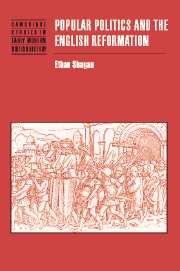Book contents
- Frontmatter
- Contents
- Acknowledgements
- List of abbreviations
- Note on the text
- Introduction
- Part I The break with Rome and the crisis of conservatism
- Part II Points of contact: the Henrician Reformation and the English people
- Part III Sites of Reformation: collaboration and popular politics under Edward VI
- 7 Resistance and collaboration in the dissolution of the chantries
- 8 The English people and the Edwardian Reformation
- Conclusion
- Bibliography
- Index
- Cambridge Studies in Early Modern British History
7 - Resistance and collaboration in the dissolution of the chantries
Published online by Cambridge University Press: 05 July 2009
- Frontmatter
- Contents
- Acknowledgements
- List of abbreviations
- Note on the text
- Introduction
- Part I The break with Rome and the crisis of conservatism
- Part II Points of contact: the Henrician Reformation and the English people
- Part III Sites of Reformation: collaboration and popular politics under Edward VI
- 7 Resistance and collaboration in the dissolution of the chantries
- 8 The English people and the Edwardian Reformation
- Conclusion
- Bibliography
- Index
- Cambridge Studies in Early Modern British History
Summary
In February 1539, Archbishop Cranmer's client John Marshall wrote to Thomas Cromwell describing the progress of the Reformation in the East Midlands. Marshall's report was at times unabashedly biased, but he also was not afraid to deliver bad news, for instance regarding people's fears of new taxes and unwillingness to work on abrogated feast days. In particular, he was concerned to describe the social repercussions of the dissolution of the monasteries, and in the process he left us a fascinating, if all too brief, analysis:
Abbeys be now nothing esteemed or pitied, for the commons say they now perceive more commonwealth to grow to them by their suppressing than was afore. For they say many good farms and other benefits come thereby daily abroad, which they [the monks] heretofore kept and had accumulated in great number to their own singular profits and advantages, saying they [the monks] were but the bellymonds and gluttons of the world, and the most vicious persons of the world, saving they [the commons] think there is much and great losses of their prayers.
The last clause in Marshall's analysis belies the easy confidence of his initial observations. The commons may have been pleased with the material benefits gained from the dissolution of the monasteries, but the great tragedy they perceived in the downfall of the religious orders was the elimination of so many prayers.
- Type
- Chapter
- Information
- Popular Politics and the English Reformation , pp. 235 - 269Publisher: Cambridge University PressPrint publication year: 2002



